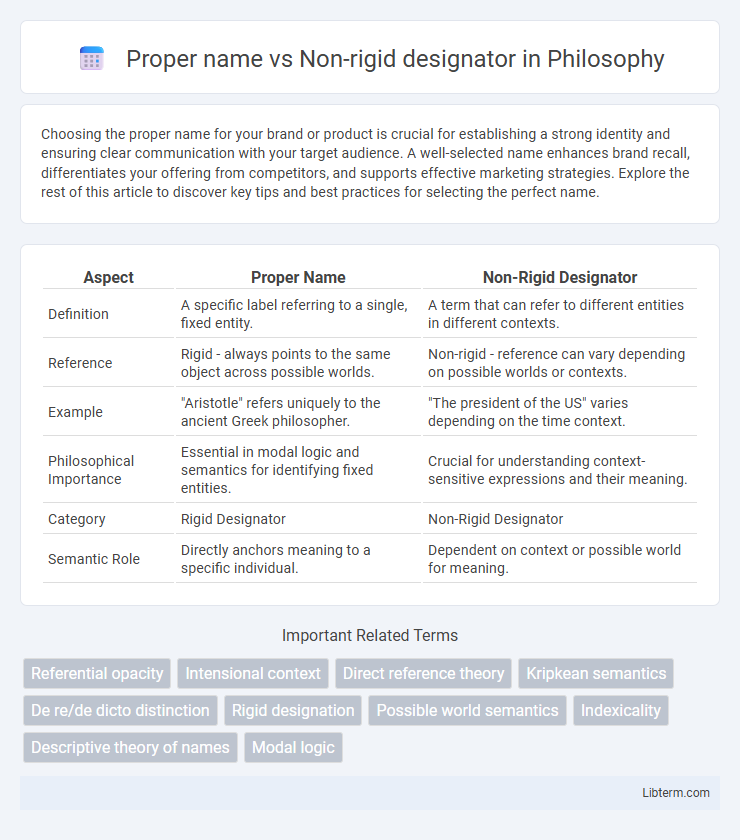Choosing the proper name for your brand or product is crucial for establishing a strong identity and ensuring clear communication with your target audience. A well-selected name enhances brand recall, differentiates your offering from competitors, and supports effective marketing strategies. Explore the rest of this article to discover key tips and best practices for selecting the perfect name.
Table of Comparison
| Aspect | Proper Name | Non-Rigid Designator |
|---|---|---|
| Definition | A specific label referring to a single, fixed entity. | A term that can refer to different entities in different contexts. |
| Reference | Rigid - always points to the same object across possible worlds. | Non-rigid - reference can vary depending on possible worlds or contexts. |
| Example | "Aristotle" refers uniquely to the ancient Greek philosopher. | "The president of the US" varies depending on the time context. |
| Philosophical Importance | Essential in modal logic and semantics for identifying fixed entities. | Crucial for understanding context-sensitive expressions and their meaning. |
| Category | Rigid Designator | Non-Rigid Designator |
| Semantic Role | Directly anchors meaning to a specific individual. | Dependent on context or possible world for meaning. |
Introduction to Proper Names and Non-Rigid Designators
Proper names function as rigid designators, uniquely referring to the same entity across all possible worlds, thereby ensuring consistent identification in modal contexts. Non-rigid designators, such as definite descriptions, vary in reference depending on contextual factors or possible worlds, lacking the fixed referential stability of proper names. Understanding this distinction is essential for analyzing meaning, reference, and identity in philosophical semantics and logic.
Defining Proper Names: Semantics and Usage
Proper names function as rigid designators, referring consistently to the same individual or entity across all possible contexts, ensuring semantic stability. In contrast, non-rigid designators can refer to different entities depending on the context, lacking fixed semantic reference. Understanding proper names involves analyzing their syntactic properties and their role in semantic representation, highlighting their distinct function in naming conventions and linguistic communication.
The Concept of Non-Rigid Designators in Philosophy
Non-rigid designators refer to terms that can designate different entities in different possible worlds, contrasting with proper names that rigidly refer to the same individual across all possible contexts. In philosophy, especially in modal logic and the philosophy of language, non-rigid designators challenge the notion that names have fixed references by allowing descriptions to vary depending on circumstances or possible worlds. This concept, introduced by Saul Kripke, has significant implications for understanding meaning, reference, and necessity in linguistic and metaphysical analysis.
Historical Perspectives: Kripke and the Naming Debate
Saul Kripke revolutionized the naming debate by distinguishing proper names as rigid designators that refer to the same entity across all possible worlds, contrasting with non-rigid designators whose references can vary contextually. This historical shift challenged descriptivist theories dominant before Kripke, which treated names as shorthand for definite descriptions. Kripke's insights underscored the semantic stability of proper names and reshaped philosophical understanding of reference and meaning.
Proper Names as Rigid Designators: Key Arguments
Proper names function as rigid designators by consistently referring to the same individual across all possible worlds in modal logic. This essentialist role contrasts with non-rigid designators, such as definite descriptions, which can vary in reference depending on context or world. Key arguments supporting proper names as rigid designators include Kripke's causal-historical theory and the necessity of identity statements involving proper names.
Contrasting Non-Rigid Designators with Rigid Ones
Non-rigid designators refer to terms whose reference can change across possible worlds or contexts, such as descriptions like "the current president," which vary over time. Proper names are typically rigid designators, meaning they consistently refer to the same individual in all possible worlds where that individual exists, such as "Aristotle" always designating the same historical figure. This contrast highlights the semantic stability of rigid designators compared to the context-dependent reference of non-rigid designators in philosophical and linguistic analysis.
Ambiguity and Reference in Proper Naming
Proper names function as rigid designators, consistently referring to the same entity across all possible contexts, which reduces ambiguity in reference. Non-rigid designators, by contrast, refer to different entities depending on context or circumstances, introducing ambiguity in identifying the referent. The clarity in proper naming hinges on its semantic stability, ensuring that the reference is unambiguous and precisely anchored to a specific individual or object.
Semantic Implications for Identity and Reference
Proper names function as rigid designators, consistently referring to the same individual across all possible worlds, thereby providing semantic stability in identity and reference. Non-rigid designators, such as definite descriptions, vary in reference depending on context or possible worlds, leading to potential ambiguity or variability in identifying the subject. This distinction impacts semantic theory by clarifying how language users maintain identity over time and across counterfactual scenarios, influencing logical analysis and ontology in linguistic contexts.
Challenges in Distinguishing Proper Names from Non-Rigid Designators
Challenges in distinguishing proper names from non-rigid designators arise due to their overlapping referential functions in natural language, where proper names typically refer to specific, unique entities while non-rigid designators can denote different entities across possible worlds. The ambiguity intensifies when context affects reference, as seen in modal logic and semantics, complicating the semantic parsing of expressions such as "the current president" versus "Barack Obama." This necessitates sophisticated linguistic and philosophical tools to unravel context-dependent meanings and ensure precise interpretation in semantic theory and computational linguistics.
Conclusion: Philosophical and Linguistic Implications
Proper names serve as rigid designators, consistently referring to the same entity across possible worlds, whereas non-rigid designators vary their referent depending on context or conditions. This distinction underpins critical philosophical debates on reference, identity, and meaning, highlighting challenges in understanding how language connects with the world. Linguistically, recognizing the rigidity of proper names informs semantics and pragmatics, shaping theories of communication and cognitive processing of meaning.
Proper name Infographic

 libterm.com
libterm.com